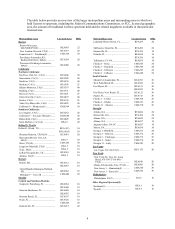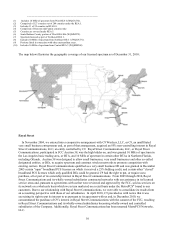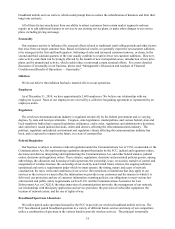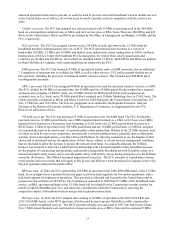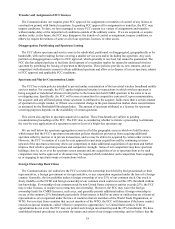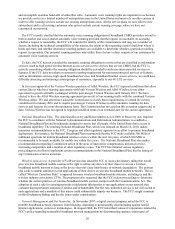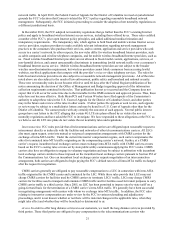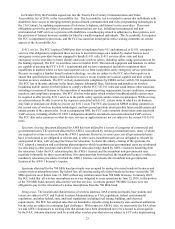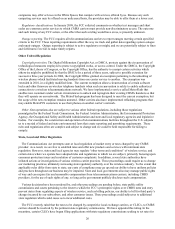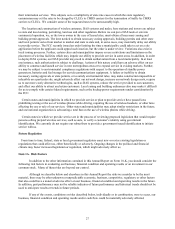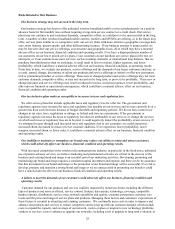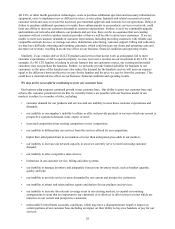Metro PCS 2010 Annual Report Download - page 29
Download and view the complete annual report
Please find page 29 of the 2010 Metro PCS annual report below. You can navigate through the pages in the report by either clicking on the pages listed below, or by using the keyword search tool below to find specific information within the annual report. 19
indirect ownership of our equity by foreign entities is below the benchmarks established by the Communications
Act. If we were to have foreign ownership in excess of the limits, we have the right to acquire that portion of the
foreign investment which places us over the foreign ownership restriction as set forth in our articles of
incorporation.
General Regulatory Obligations
The Communications Act and the FCC’s rules impose a number of requirements on wireless broadband mobile
services licensees. A failure to meet or maintain compliance with the Communications Act and the FCC’s rules
could subject us to fines, forfeitures, penalties, license revocations, or other sanctions, including the imposition of
mandatory reporting requirements, compliance programs or corporate monitoring, or limitations on our ability to
participate in future FCC auctions or to acquire spectrum.
CMRS classification. Certain of our wireless broadband mobile services are classified at the federal level as
CMRS. The FCC regulates providers of CMRS services as common carriers, which subjects us while we provide
such services to many requirements under the Communications Act and FCC rules and regulations. The FCC,
however, has exempted CMRS services from some typical common carrier regulations, such as tariff and interstate
certification filings, which allows us and our competitors to respond more quickly to competition in the marketplace.
The FCC also is encouraged by federal law to reduce unreasonable disparities in the regulatory treatment of similar
wireless broadband mobile services, such as cellular, broadband PCS, AWS, 700 MHz, and Enhanced Specialized
Mobile Radio, or ESMR, services, and federal law preempts state rate and entry regulation of CMRS providers, but
allows states to regulate the other terms and conditions of service.
The FCC has found, for the time being, that wireless broadband Internet access service offered at speeds in excess
of 200 kbps in at least one direction, which would include our 4G LTE services, is an information service under the
Communications Act, and thus is not subject to traditional common carrier regulation. In addition, the FCC has
found that the transmission component of wireless broadband Internet access service meets the definition of
telecommunications under the Communications Act and that the offering of a telecommunications transmission
component as part of a functionally integrated Internet access service offering is not a regulated telecommunications
service under the Communications Act. Further, the FCC has found that mobile wireless broadband Internet access
service is not a “commercial mobile service” under Section 332 of the Communications Act. Carriers offering
mobile wireless broadband Internet access services are not considered common carriers and have no common carrier
obligations with respect to this service. Accordingly, as a result of such classification decisions, we and our
competitors generally have greater flexibility in establishing the terms and conditions, including pricing, of this
service than we do for services classified as common carrier services. However, these classification decisions could
change over time, either as a result of FCC or Congressional actions, in an effort to assure that competing services
are subject to comparable regulatory requirements. For example, in a recent order, the Commission adopted rules,
commonly referred to as the “Net Neutrality” or “Open Internet” rules, subjecting mobile wireless broadband
Internet access providers, such as us, to certain transparency requirements, and certain restrictions on the blocking of
access to lawful websites and some third party applications, subject to reasonable network management provisions,
which could limit our ability to provide certain services, requires us to not block customers’ access to services
competitive with our voice and video telephone services, and could limit our ability to establish the terms and
conditions, including pricing, of Internet access offered by us. “See – Net Neutrality.”
The FCC permits wireless broadband mobile services licensees to offer fixed services on a co-primary basis along
with mobile services. This facilitates the provision of wireless local loop service by CMRS licensees using wireless
links to provide local telephone service. The extent of lawful state regulation of such wireless local loop service is
undetermined. While we do not presently offer a fixed service, our network can accommodate such an offering. We
continue to evaluate our service offerings, and may offer a fixed service at some point in the future, which may
subject us to additional state regulation.
Roaming. The FCC long has required CMRS providers to permit customers of other carriers to roam “manually”
on their networks, for example, by supplying a credit card number, as long as the roaming customer’s handset is
technically capable with the roamed-on network. The FCC also has ruled that automatic voice roaming is a common
carrier obligation for CMRS carriers and CMRS carriers must provide certain automatic voice roaming services to
other CMRS carriers upon reasonable request and on a just, reasonable, and non-discriminatory basis pursuant to
Sections 201 and 202 of the Communications Act. Specifically, this automatic voice roaming obligation extends to
services such as ours that are real-time, two-way switched voice or data services that are interconnected with the
public switched network and utilize an in-network switching facility that enables the provider to reuse frequencies


